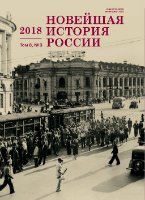Перспективы экономического развития Китайско-Восточной железной дороги после Русско-японской войны: региональный аспект и петербургская политика
Prospects for the economic development of the Chinese Eastern Railway after the Russo-Japanese War: The regional dimension and the St. Petersburg policy
Author(s): Denis Gennadievich Yanchenko, E. O. StarovoytovaSubject(s): Diplomatic history, Economic history, Military history, Recent History (1900 till today), Economic development
Published by: Издательство Исторического факультета СПбГУ
Keywords: Chinese Eastern Railway; Russian-Japanese War; State Duma; First Russian Revolution; Ministry of Finance; economy; exclusion zone; railway construction;
Summary/Abstract: The management system in the «line side» of the Chinese Eastern Railway (CER) was subject to significant adjustments under the influence of external and internal factors after 1905. Russian officials, in cooperation with the members of the State Duma and the military officers, were regulating economic policy along the railway line, trying to counter the growing influence of Japan. The article is based on archival materials and regional periodicals. It is shown that after the end of the Russo-Japanese War and the suppression of the First Russian Revolution, the economic situation of the CER remained in the very focus of government attention. The historiographical review includes the works of modern Chinese researchers, little known to a wide range of readers, and highlights their view on the economic impact of the CER in the context of relations between China, Russia, and Japan in the early 20th century. The need to put the road into operation as quickly as possible on the eve of a clash with Japan led to the fact that after the war the budget funds had to be used to correct structural defects, modernize infrastructure, improve settlements along the road. The structure of government expenditures is analyzed. The construction of an alternative Amur railway, the needs of the domestic market of the empire required not only the redistribution of rolling stock but also the adjustment of the government’s course. Using the right to consider budget expenditures, the liberal opposition in the Duma tried to criticize the administrative and economic activities of the CER Society. However, the Ministry of Finance repulsed the deputies interests, just like the representatives of the military.
Journal: Новейшая история России
- Issue Year: 8/2018
- Issue No: 24
- Page Range: 583-597
- Page Count: 15
- Language: Russian

